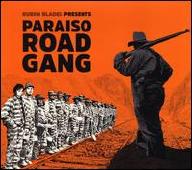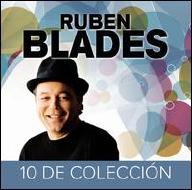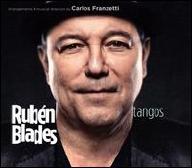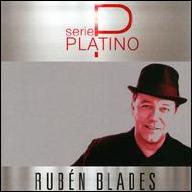Blades was born and raised in a middle-class neighborhood in Panama City. He inherited his musical talents from his parents. His mother, Anoland, who emigrated from Cuba, played piano and sang in Spanish. His father, Ruben Sr., a police detective, played bongos. Inspired by the doo wop singing of Frankie Lymon the Teenagers, Blades began singing North American pop and rock songs in his early teens. In 1963, he became the lead singer of a band, the Saints, formed by his older brother Luis. The political upheaval in Panama during the mid-'60s had a profound effect as Blades became increasingly committed to his own roots, refusing to sing in any language but his native Spanish.
While studying law at the University of Panama, Blades continued to be involved with his music, singing with Conjunto Latino and Los Salvajes del Ritmo. In 1968, an album he recorded with Bush the Magnificos reached Joe Cuba's producer in New York. Invited to join Cuba's band, he declined in order to complete college. When the Panamanian government closed the university, he made his first trip to the United States. While in the U.S., Blades recorded an album, From Panama to New York, with Pete Rodriguez. Shortly after the record's release, the University of Panama was reopened and Blades returned to complete his undergraduate studies. Although he accepted a position as a lawyer for the Bank of Panama, following his graduation he returned to the U.S., to visit his parents, who had immigrated to Miami in 1974.
While in the United States, Blades traveled to New York and took a job in the mailroom of the Latin-oriented Fania record label. A year later, he replaced Tito Allen as featured vocalist in Ray Barretto's band, auditioning in Fania's mailroom. When Barretto left to form a Latin fusion group, Blades took over as bandleader and renamed the group Guarare. In 1975, Blades composed and sang lead on Barretto's recording "Canto Abacua," featured on the album Barretto. As a result, Blades was named Composer of the Year by Latin New York magazine. Blades had also been playing with Willie Colón's band, and he remained with Colón for six years. Their collaboration reached its apex with the three-million-copy-selling album Siembra, which included the single "Pedro Navaja," the highest-selling single in salsa history. Blades' politically oriented lyrics were not universally accepted. In 1980, his song "Tiburon," which spoke out against superpower intervention in the Caribbean, was banned from radio airplay in Miami.
Forming his own band, Los Seis del Solar, in 1982, Blades began to perform an exciting fusion of Latin, rock, reggae, and Caribbean music. Their debut album, Buscando América, was released in 1983. A year later, Blades enrolled in graduate school at Harvard University, eventually receiving a master's degree in international law.
Since the early '80s, Blades has balanced his musical career with acting and writing songs for such films as The Last Fight, Crossover Dreams, Critical Condition, Fatal Beauty, The Milagro Beanfield War, Dead Man Out, Disorganized Crime, The Lemon Sisters, The Two Jakes, Predator 2, One Man's War, The Josephine Baker Story, Crazy from the Heart, Color of Night, A Million to Juan, Scorpion Spring, and The Devil's Own. With Paul Anthony, Blades shared the title role in Paul Simon's Broadway musical The Capeman. While much of Blades' repertoire is in Spanish, he recorded the covers album Nothing But the Truth in English in 1988; it included songs by Lou Reed, Elvis Costello, and Sting. The set made the Top 200.
Blades remained active in politics. The founder of a new political party in Panama, he ran for president there in 1994, coming in second in the election. The 1990s were relatively busy ones for Blades. He kept up his musical career and released a host of critically and commercially successful albums, including Ruben Blades y Seis del Solar...Live! (1990), Caminando (1991), and Amor y Control (1994). He also made an impressive independent run for Panama's presidency, but ultimately came in second to Ernesto Pérez Valladares. In 1996 he released La Rosa de los Vientos, his first album with Panamanian bandleader Robert Delgado's orchestra. He closed the century with a slew of Grammy-nominated albums including the winner Tiempos in 1999. He won another for 2002's Mundo.
In 2004, Blades put his artistic career on hold to serve a five-year appointment as Panama's minister of tourism. That year did see the release of Across 110th Street, a full collaboration with the Spanish Harlem Orchestra, it took home a 2005 Grammy Award for Best Salsa/Merengue Album. Despite his Live! In Concert DVD in 2006 and De Panama a Nueva York in 2008, he didn't resume his studio recording career proper until releasing Cantares del Subdesarrollo on his Ruben Blades Productions label in 2009. It took home a Latin Grammy for Best Singer/Songwriter Album. The singer also reunited with his Buscando America-era outfit Seis del Solar to celebrate the 25th anniversary of their collaboration on their breakthrough album, resulting in a pair of concert offerings entitled Todos Vuelven Live, in 2011.
Blades and Cheo Feliciano began talking of a collaboration before the former assumed his government post. The latter began assembling tunes and cutting music with his own band, delivering a strategy whereby each man would cover the other's music. Blades added his vocal tracks upon resigning his post, and the album Eba Say Aja was released in 2012.
After a world tour with Delgado's group, Blades released Tangos in 2015; the charting record won a Grammy for Best Latin Pop Album and a Latin Grammy for Best Tango Album. That same year, Blades was cast in the regular role of Daniel Salazar in the AMC post-apocalyptic drama Fear the Walking Dead.
The album Son de Panamá, a 2016 reunion with the Robert Delgado Orquesta, won the Best Tropical Latin Album Grammy. Two years later, the pair reteamed for Salsa Big Band and won the same award. In 2018 Blades was featured on Lin-Manuel Miranda's charity single "Almost Like Praying" to raise money for victims of Hurricane Maria in Puerto Rico.
In the fall of 2018, Blades was appointed NYU Steinhardt Dean's Inaugural Scholar-in-Residence at New York University. Once more in collaboration with Delgado's group, Blades issued Medoro Madera, a set primarily comprised of boleros with some left turns into Latin funk territory. 2019's Paraíso Road Gang was a futurist Latin rock album. Its single "No Te Calles" was recorded in collaboration with Kansas City-cum-Los Angeles Latin rock band Making Movies. The album also saw a Latin Grammy nod.
In 2019, Una Noche con Rubén Blades (with Jazz at Lincoln Center Orchestra and Wynton Marsalis) placed inside the Top Ten on jazz charts and earned a 2020 Grammy nomination for Best Latin Jazz album. The following year, he reteamed with Delgado's orchestra yet again for the critically acclaimed Salswing! While the hard-charging big-band album didn't chart, it did win the Latin Grammy for Album of the Year in 2021, and a 2022 Grammy for Best Tropical Latin Album. In June, Blades and Brazilian MPB vocal group Boca Livre released Parceiros. Blades had heard the Brazilian vocal group Jongo Trio in 1966 and from that moment on aspired to record with a similar ensemble. Boca Livre, a popular vocal group since making their self-titled debut in 1979, enthusiastically assisted him in realizing that ambition some 56 years later. ~ Craig Harris & Thom Jurek, Rovi
























